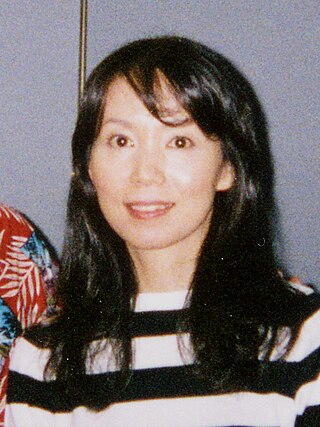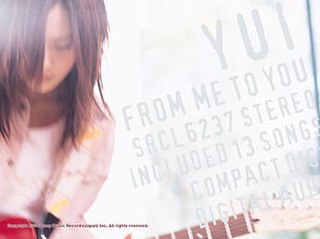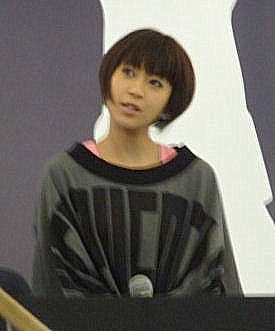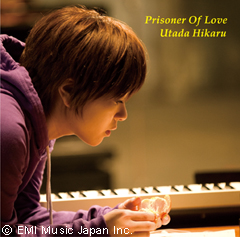
Mariya Takeuchi is a Japanese singer and songwriter. Regarded as an influential figure in the city pop genre, she is one of the best-selling music artists in Japan, having sold over 16 million records, and has received several accolades. Her husband is Tatsuro Yamashita, a singer-songwriter and record producer.

From Me to You is the debut album by Japanese singer and songwriter Yui. It was released on February 22, 2006, by Sony Music Japan. The album title is derived from the Beatles's 1963 song "From Me to You." From Me to You is primarily a pop rock record with elements of folk rock and blues rock. Lyrically, it explores themes of love, frustration, and relationships.

"Koi no Tsubomi" is a song recorded by Japanese singer Koda Kumi, serving as her 31st solo under Rhythm Zone. It was the first single to bring in the new era after Best: Second Session. The single was released in CD and CD+DVD and charted at number two on Oricon, selling over 140,000 copies in its first week and staying on the charts for 21 weeks. It became the highest selling song debut for a female artist, until Ayumi Hamasaki surpassed it with her single "Blue Bird", which came out a month later on June 21.

The discography of Japanese-American R&B and pop singer Hikaru Utada consists of eleven studio albums, four compilation albums, eleven video albums and numerous singles and promotional singles. Utada began as a musician in the early 1990s as a member of U3, a family unit made up of her, her mother Junko Utada, also known as 1970s enka singer Keiko Fuji, and her father, musical producer Teruzane Utada. U3 released their debut album Star in 1993, with the hope to debut in America. In 1996, the group was rebranded as Cubic U, an R&B project focusing on Hikaru Utada, resulting in the English language album Precious in 1998 with record label Toshiba EMI.

"Blue Bird" is a song by Japanese recording artist Ayumi Hamasaki. It was released as her 40th single under Avex Trax on June 21, 2006. "Blue Bird" was Hamasaki's 15th consecutive single to top the Oricon Singles Chart and 27th number one single in total. Initially planned to be a triple A-side single, it features two new songs, "Blue Bird" and "Beautiful Fighters". "Blue Bird" was the CM song for Zespri Gold Kiwifruit while "Beautiful Fighters" is featured on a Panasonic D-snap and D-dock commercial. A rearrangement of "Ladies Night", featured in her (Miss)understood album, called "Ladies Night " is also featured on this single. A trance remix to "Blue Bird" is also on the single. On her official website, she describes "Blue Bird" as being a summer song, and "Beautiful Fighters" as being a song praising women.
"Hide & Seek" is a song by Japanese singer Namie Amuro from her eighth studio album, Play (2007). It was released as a promotional single from the album on June 27, 2007. It is one of the two new songs to have a music video and is being used to promote the album. It has dance, hip hop, and R&B tones and has a synthesized voice in the verses. Amuro stated in an interview that "Hide & Seek" was the perfect song to open the album because of its "marching band" feel at the beginning of the song. Amuro won the "Best R&B Video" prize for the song at the MTV Video Music Awards Japan 2008.

Ai no Uta(愛のうた / Song of Love) is the 37th single released by Japanese pop singer-songwriter Kumi Koda. The single was released in CD and CD+DVD, with limited editions carrying the "Urban Kiss Version" of Ai no Uta. The single was released on September 12, 2007, and followed the theme of Yume no Uta/Futari de... as an autumn/winter-time love ballad. It charted at No. 2 on Oricon and stayed on the charts for twenty-two weeks.

"Prisoner of Love" is Hikaru Utada's 21st Japanese single and 30th single overall. It was cut from her fifth Japanese album, Heart Station (2008), making it her first Japanese recut single in nine years since "First Love" in 1999. "Prisoner of Love" is the theme song for the Fuji TV dorama Last Friends, making it her first song since "Sakura Drops" in 2002 to be used as a main theme song. It was released as a digital download on March 26, 2008, and as a CD single on May 21.

"Rewrite" is a song by Japanese rock band Asian Kung-Fu Generation. It was released as the third single of their second full-length studio album, Sol-fa, on August 4, 2004. In 2016, they re-recorded "Rewrite" along with all songs from Sol-fa and released on November 30, 2016.

Holidays in the Sun is the fourth studio album by Japanese singer-songwriter Yui. It was released on July 14, 2010, by gr8! Records. This was her first album release in about one year and eight months since My Short Stories (2008), and her first original album release in two years and three months since I Loved Yesterday (2008). The title of the album comes from the song of the same name by the band English Sex Pistols. Beginning in early 2008, the album's production was handled by longtime collaborator Hisashi Kondō. Yui served as the sole lyricist and composer on Holidays in the Sun, as she had on all of her preceding albums. Holidays in the Sun is primarily a J-pop album with numerous elements of pop rock, folk pop, bossa nova, gospel music, and pop ballads.

"Jumping" is a song performed by South Korean girl group Kara from their debut Japanese album, Girl's Talk (2010) and their fourth EP, Jumping (2010). It was released on November 10, 2010, as the second Japanese single.

"Go Go Summer!" is a song performed by South Korean girl group Kara. It was released as the fourth Japanese single on June 29, 2011 but was earlier released digitally on iTunes Japan on June 22, 2011. It was released in four different versions, three limited editions and one regular edition.

The discography of Japanese-American singer-songwriter Ai consists of thirteen studio albums, four extended plays (EP), seven compilation albums, one live album, one mix tape, ten video albums and numerous solo and collaboration singles.

"Koi ni Ochitara" is a song recorded by Japanese singer Crystal Kay for her sixth studio album Call Me Miss… (2006). Written by H.U.B. and Shingo.S with production handled by Sakazume MisakIt, it was released as her 17th physical single through Sony Music Japan on May 18, 2005. The single is supported with the B-side tracks "Love It Take It" and "Bet You Don't Know "; the latter track was originally included as part of her previous album Crystal Style (2005).
Japanese singer Shizuka Kudo has released eighteen studio albums, fourteen compilation albums, one EP, two cover albums, six video albums, twelve live video albums, two box sets, and forty-three singles. Her career began in 1985 when she debuted as one of the three vocalists of the girl group Seventeen Club. The short-lived group disbanded after two unsuccessful singles. In 1986, she joined the idol girl group Onyanko Club as member number 38, which led to Kudo forming the subgroup Ushirogami Hikaretai the following year. She released her first solo single, "Kindan no Telepathy", on the same day as the last broadcast of the variety show Yūyake Nyan Nyan, from which the Onyanko Club members originated. It debuted at number one on the Oricon Singles Chart and became the first of eleven total number-one singles released in the late 1980s and early 1990s, including "Koi Hitoyo", "Arashi no Sugao", "Kuchibiru Kara Biyaku", "Senryū no Shizuku" and "Please". Miyuki Nakajima penned the following singles released by Kudo during this era: "Fu-ji-tsu", "Mugon... Iroppoi", "Kōsa ni Fukarete", "Watashi ni Tsuite" and Dōkoku". All five singles debuted at number one and, with total sales exceeding a million, "Dōkoku" became the best-selling single of Kudo's career.

King & Prince is a two-member Japanese idol group under Starto Entertainment that debuted in 2018. Their debut was announced at a press conference on 17 January 2018 along with the establishment of Johnny & Associates' new record label under Universal Music, Johnny's Universe, with King & Prince becoming the first artists to sign under the label. They have sold 12.3 million physical copies in Japan.

Japanese idol group Nogizaka46 has released thirty-one singles and six albums, as well as numerous music videos and concert performance videos. Million-selling singles have included "Influencer" and "Synchronicity", each of which won a Japan Record Awards Grand Prix, as well as "Kaerimichi wa Tōmawari Shitaku Naru" and "Sayonara no Imi". Album releases include the studio albums Tōmei na Iro, Sorezore no Isu, Umarete kara Hajimete Mita Yume, and Ima ga Omoide ni Naru made. The group also released a compilation of "under" songs, written for members who perform at concerts but are not part of the main selection group for promoting singles, with the title Boku dake no Kimi: Under Super Best. They released the 10-year-anniversary greatest hits album, titled Time Flies.
Official Hige Dandism, commonly abbreviated Higedan (ヒゲダン), is a pop rock band formed in Shimane, Japan in 2012.
King Gnu is a Japanese band formed in 2013. It consists of Daiki Tsuneta, Satoru Iguchi, Kazuki Arai (bassist) and Yu Seki (drummer). The band's main songwriter is Daiki Tsuneta, who also performs as part of the creative collective Millennium Parade.
Ado is a Japanese singer and songwriter. In 2020, at the age of 17, she made her debut with the digital single titled "Usseewa", which peaked at number 1 on Billboard Japan Hot 100, Oricon Digital Singles Chart, and the Oricon Streaming Chart. The song reached 100 million plays on Billboard Japan within 17 weeks of charting, which was the sixth fastest in history and the youngest for a solo singer. In 2022, her song "New Genesis" was used as the theme song for the anime film One Piece Film: Red and topped Apple Music's Global Top 100 charts.














